
CES 2024 sure had a slew of interesting surprises, main among them being transparent OLEDs and robot projectors, but a prototype TV screen out of Sharp just might be the most influential of the bunch.
First reported by Digital Trends, who were among the very few granted access to the closed door demo, Sharp’s dual QDEL TV prototypes (yes, 2 working versions) could spell the future of TVs.
These displays leverage so-called Quantum Dot Electroluminescent technology (QDEL), which many in the industry claim is the crème de la crème of TV tech, far surpassing OLEDs through several improvements upon the pain points of OLED screens, ie burn-in, color balancing, brightness, and more.
Sharp did not give any additional information on when or where its prototype displays would find their primary homes, though the company did allude to smaller screens, like smartwatches, PC monitors, and phone screens, as being the main priority at the moment.
A new (potentially cheaper) frontier for TVs
The incredible assortment of display technology grows ever larger as well-marketed terminology is soon starting to trip over itself. The TV industry is jam packed with abbreviations like QNED, QLED, QD-OLED, ULED, and now, seemingly thanks to Sharp, QDEL displays.
To not get confused, QD-OLED is a blend of Quantum Dot technology as seen on QLED TVs with OLED display tech, whereas QDEL is somewhat similar in its use of Quantum Dots, often even being referred to as QD-LED (Quantum Dot Light Emitting Diode) and even AMQLED. For ease of understanding, though, let’s stick to QDEL for now.
Unlike QD-OLEDs or even QLEDs, potential QDEL TVs will instead use quantum dots that receive energy via electricity, thus allowing these displays to emit colors on their own without the help of an OLED or LED light source. Additionally, QDEL TVs will have blue quantum dots that can reach the same brightness levels of existing red and green ones, a headache that has plagued the industry and is seemingly quelled thanks to those seen amid Sharp’s demo.
Get instant access to breaking news, the hottest reviews, great deals and helpful tips.
Many industry experts claim QDEL tech as the “holy grail” of display technology due to the fact that it’s essentially an OLED panel without all of the nasty downsides. The problem is that this technology is still in the early stage, with the first iterations of QDEL screens dating back to 2020 with BOE’s 55-in AMQLED.
In regards to its own prototypes, as per Digital Trends, Sharp makes it clear that this new frontier in display technology could spell a future of cheaper TVs. What makes the QDEL model so worthwhile, at least in terms of Sharp’s manufacturing process, is its similarity to the development of LED TVs, which require simpler techniques over the OLED’s process that necessitates several exotic materials.
A Sharp image of the future
According to Digital Trends, Sharp had 2 QDEL displays for entrants to ogle at, including single 12-in and 30-in prototypes. The latter was barred from being shown to the public, which might just show how early development these screens truly are.
Given this distinction, it’s clear that the first several QDEL screens to hit the market will most likely be found in smaller form factors, and this is backed up by Sharp itself. Smaller displays as seen on smartwatches, smartphones, laptops, and even PC monitors will be some of the overriding displays to see the QDEL treatment, as per Sharp via Digital Trends.
The company remained incredibly quiet on any mass production timelines and, although it does seemingly have a working QDEL TV at 30-in (which is good news for market scalability), we may still have quite a long wait before we see any real QDEL displays out in the wild.
As this new display tech gains traction, it will be interesting to see where in the industry it heats up the most and who potentially could become the market leader of QDEL TVs.
More From Tom's Guide
- Move over LG, Sharp is getting into the QD-OLED TV game
- Sharp just unveiled the first Roku OLED TV ever — and it’s available now
- Samsung just revealed a transparent microLED TV at CES 2024, and I saw it up close

Ryan Epps is a Staff Writer under the TV/AV section at Tom's Guide focusing on TVs and projectors. When not researching PHOLEDs and writing about the next major innovation in the projector space, he's consuming random anime from the 90's, playing Dark Souls 3 again, or reading yet another Haruki Murakami novel.
 Club Benefits
Club Benefits





